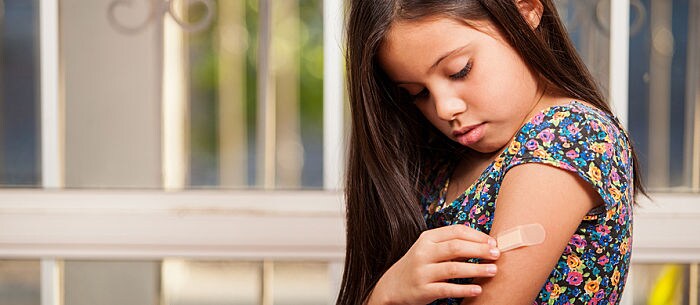Insect bites are just as much a mainstay of summer as the family barbecue — but much less enjoyable! Luckily, most bug bites are only annoying and not life threatening. According to Dr. Khalilah Babino, a doctor of family medicine and assistant professor at Loyola University Chicago Stritch School of Medicine, “The majority of insect bites only cause symptoms that bug us and shouldn’t cause alarm.” Here are some symptoms of different bug bites, how to treat them and how to know when your little one needs medical attention.
Mosquito Bites
Mosquito bites appear as puffy, hive-like bumps that become itchy, red and irritated within a few hours. Try to leave your child’s bites uncovered and open to the air while they’re healing. Covering them up with clothing can add to the itchiness. If necessary, use a topical anti-itch cream like calamine lotion or hydrocortisone cream. To help soothe persistent itching, try an oral antihistamine (such as Children’s Benadryl), recommends Dr. Babino. Check with your pediatrician before administering any meds.
Chigger Bites
Chiggers cause small bumps with an intense itch. Often the bites appear in clusters and may form a rash lasting up to a week or more. Though it can be tough, discourage your child from scratching, as this can delay the healing process and may lead to infection. You can apply an anti-itch cream or a cold compress to the bite area to help stave off irritation.
Flea Bites
Flea bites appear as small, itchy, sore and sometimes painful bumps. They usually appear in clusters and typically last anywhere from a few hours to a day or more. Wash the area with soap and water to reduce the risk of infection. Then apply an anti-itch cream to soothe irritation.
Bed Bug Bites
Bites from these pests look similar to mosquito bites. Your child will experience red, swollen and itchy bumps — only more of them, arranged in a line or cluster. These symptoms typically last a few days to a week. Treat them as you would mosquito bites, by reducing irritation and leaving them uncovered. Don’t forget to contact a professional as soon as possible to eliminate bed bugs from your home to prevent future bites!
Bee Stings
Stings from bees, wasps and fire ants cause “pain, swelling and redness at the sting site,” says Dr. Bill Dolen, professor of pediatrics and an allergist at Georgia Regents Medical Center/Children’s Hospital of Georgia. These symptoms usually only last a few hours to a day. If you notice that a stinger is still in the wound, try to pull it out with tweezers or your fingernail. To reduce pain and inflammation, give your little one acetaminophen or ibuprofen as directed by your pediatrician.
And read How to Treat a Bee Sting.
Tick Bites
Unless the insect is still attached to the skin, a tick bite can be difficult to determine. It may appear as a red spot, rash or “bull’s-eye” lesion. First, remove the entire tick using tweezers. Then wash out the area with soap and water, and keep an eye on the area to see if a rash develops. Call your pediatrician if your child develops a fever or complains of joint pain as that could indicate an infection as well.
For more information on tick bites, learn about lyme disease in children.
When to Call The Doctor
Sometimes your child will develop a reaction to a bug bite that requires medical attention:
- Get Hives Checked Out
In some rare cases, children can develop hives in areas other than the bite area. “This may indicate a more extensive reaction,” says Dr. Babino, who recommends contacting your pediatrician to get it evaluated.
- Look Out For An Infection
Rarely, bug bites can cause a type of infection. Signs of an infection include developing a red, painful or warm-to-the-touch wound at the bite area or signs of a fever, fatigue or lethargy.
- Keep An Eye Out For Anaphylaxis — The Most Serious Allergic Reaction
According to Dr. Dolen, this “requires immediate medical attention.” Symptoms include tightness in the chest and difficulty breathing, swelling of the tongue, throat, nose and lips or dizziness and fainting or loss of consciousness. In the case of anaphylaxis, call 911 immediately.
Although it’s hard to avoid insect bites altogether, Dr. Babino recommends covering up when outdoors, applying bug spray and staying inside at sunrise and sunset when pests are most active.
Rebecca Desfosse is a freelance writer specializing in parenting and family topics.
This article is for general informational purposes only. It is not intended nor implied to be providing medical advice and is not a substitute for such advice. The reader should always consult a health care provider concerning any medical condition or treatment plan. Neither Care.com nor the author assumes any responsibility or liability with respect to use of any information contained herein.




